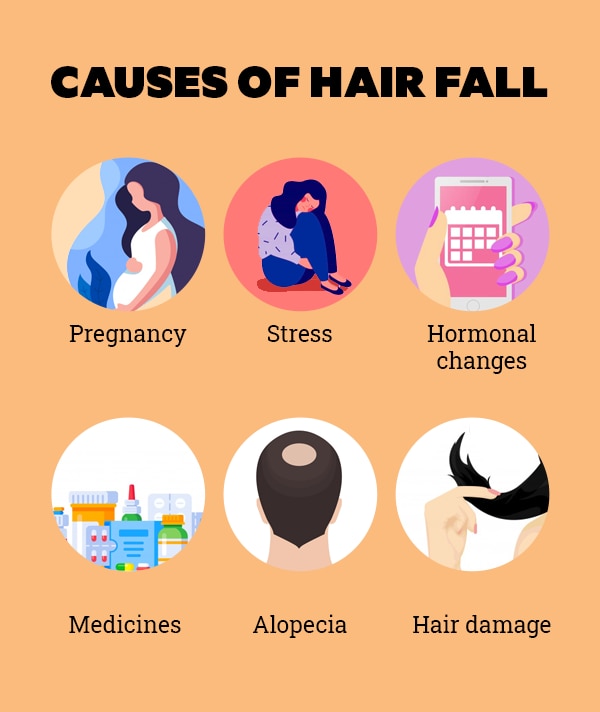Table Of Content

If you like the idea of adding supplements to your routine, there are some which are specifically formulated to contain ingredients that increase hair thickness and health. Hair loss doesn't happen fast, our strands grow in cycles, which means it can take up to 3 months for hair to fall out after a trigger has caused it. Hair loss can range in severity from mild thinning of the hair to having a receding hairline or going completely bald. The average person loses up to 100 hairs per day, so it’s natural to lose hair, but many people will experience more hair loss than this. Hair loss can begin for some people as early as their 20s or 30s, but for most people, hair loss becomes more common later in their lives as part of the natural aging process. By the age of 50, about 85% of men will have thinning hair.
Androgenetic alopecia
Alopecia means “hair loss.” There are many different types of alopecia, in addition to androgenetic alopecia. See a dermatologist as soon as possible when you notice hair loss. The sooner you get treatment, the more effective it’ll be. Your shorter hairs — like eyelashes, arm and leg hair, and eyebrows —have a short anagen phase (about one month).
Understanding hair loss
By the age of 35, two-thirds of American men will experience some degree of hair loss. Among menopausal women, about two-thirds experience hair thinning or bald spots. This is the name for hair loss caused by medications that harm your hair follicles. Radiation and chemotherapy treatments for cancer can be toxic to follicles, causing your hair to fall out within the first few weeks after you start treatment.
Find more top doctors on
I went to see a 'hair whisperer' who brought me back from hair loss - Get The Gloss
I went to see a 'hair whisperer' who brought me back from hair loss.
Posted: Wed, 24 Jan 2024 08:00:00 GMT [source]
Unless you have extremely oily hair, consider washing your hair only every other day or less. Hair transplant surgery involves moving small plugs of skin, each with a few hairs, to bald parts of your scalp. Over-the-counter (OTC) medications generally consist of topical creams, gels, solutions, or foams that you apply directly to the scalp.
Can medications like Ozempic® and Wegovy® decrease your stroke risk?
Other ways to hit your daily protein requirement include eating beans and legumes, eggs or Greek yogurt. Most of us shed hair a little at a time — pretty much all the time. A scalp infeciton can lead to scaly and sometimes inflamed areas on your scalp. You can search by location, condition, and procedure to find the dermatologist that’s right for you. Use these professionally produced online infographics, posters, and videos to help others find and prevent skin cancer. It can smooth out deep wrinkles and lines, but the results aren’t permanent.

If in doubt, it's best to speak to your GP for advice regarding an iron deficiency, as they may recommend a blood test to confirm the correct treatment. On a typical head of hair each follicle is at a different stage at different times so you probably won’t notice it happening. CCCA and LPP fall under the umbrella of lymphocytic scarring alopecia. The telltale signs of these conditions are chronic inflammation of the scalp and the scarring of hair follicles, which can result in irreversible hair loss, Agbai notes. Traction alopecia is a type of mechanical hair loss that happens when the hair follicles undergo repeated pulling or tension. Tight hairstyles like buns, braids, weaves, cornrows, and ponytails are the most common cause of traction alopecia.
Losing your hair is not usually anything to be worried about, but it can be upsetting. It's also well worth avoiding harsh chemical treatments during this time, so steer clear of relaxers and hair dye. Your doctor will also look at other areas on your body like your eyebrows, lashes, underarms, pubic area, legs and arms to assess if there’s hair loss.
These changes happen due to varying levels of hormones during menopause. This article will discuss the causes, confirmation, and treatment of itchy scalp, hair loss, and ways to minimize itching and shedding. Losing clumps of hair can be particularly distressing. But there will always be an underlying reason, whether it’s a health condition, stress levels, or family genetics. It can be hard to determine stress as the cause, as the hair loss often doesn’t occur immediately, instead falling out 3 to 6 months later. That said, if you find yourself losing clumps of hair several months after a big event like the ones mentioned above, it’s a good bet stress is the culprit.
Hormonal changes
If the stress stops, your body will readjust and the excessive shedding will stop. When the shedding stops, most people see their hair regain its normal fullness within 6 to 9 months. This is true for damaged hair follicles from too-tight hairstyles, damaged hair follicles from chemicals applied to the hair, and damages caused by certain autoimmune diseases. Alopecia areata is an autoimmune condition that causes your immune system to attack hair follicles, resulting in bald patches that can range from small to large. Anagen effluvium causes large amounts of hair to rapidly fall out during the anagen (growth) phase of the hair cycle. It may cause hair to fall out from the head, as well as from other parts of the body, including the eyebrows and eyelashes.
This usually happens because of radiation treatment or chemotherapy. It’s also the most common cause of hair loss, affecting up to 50% of people. While it’s more prevalent in older adults, anyone can experience it, including children. A person should contact a doctor for a blood test to check whether they have a nutritional deficiency that could be causing their hair to fall out. If a person thinks that hair loss may be due to a medication, they can consult a doctor for an assessment.
Hormones, as well as genetics, can play a part, leading to smaller follicles that eventually stop making hair. There are groups around the country where you can meet and socialise with other people with alopecia. For many people, their hair is an important part of who they are.
It stops the action of male hormones called androgens. Traction alopecia is a type of hair loss that's brought on by the way you style your hair. Hairstyles like cornrows, braids, or tight ponytails can cause it. Some signs of traction alopecia include hair loss in patches where the hair was pulled and shorter strands of hair near the forehead. Things that interfere with the growth cycle -- like medications, illnesses, infections, or chemicals -- have the potential to stop hair from being formed the right way. Beyond that, age, hormones, stress, and even the way you style your hair can lead to hair loss.
Trying to tell if you’re actually losing hair or just experiencing some normal shedding? Read on for more information about hair loss and how to manage it. Pregnancy, and especially giving birth, can lead to hair loss. You're most likely to see hair loss about 3 months after giving birth.
Minoxidil usually needs to be used long-term to prevent hair loss and promote hair growth. When the treatment is stopped, hair loss will begin again within 12–24 weeks. Another cause of hair loss is called telogen effluvium (TE), which is typically temporary. According to the American Academy of Dermatology (AAD), TE isn’t actually defined as “hair loss,” but rather as excessive hair shedding. Hair shedding due to an illness such as COVID-19 typically improves three to six months after recovery. For many women, hair shedding is a normal and common occurrence with the NHS highlighting that we can lose between 50 and 100 hairs a day, often without noticing.


